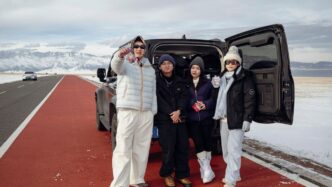Venue and Key Dates for Quantum World Congress 2025

Location: Capital One Center, Tysons, Virginia
If you’re making plans for Quantum World Congress 2025, you’ll want to head to the Capital One Center in Tysons, Virginia. This venue sits just outside Washington, D.C., and has become a popular spot for tech conferences due to its easy access, modern layouts, and, let’s be honest, a ton of nearby places to grab coffee in between sessions. The place is spacious – you won’t find yourself elbow-to-elbow in narrow hallways while trying to get to that next talk or panel. If you haven’t been out there before, expect a business-focused environment with a high-tech feel, and decent food options within walking distance.
Conference Dates: September 16–18, 2025
Mark your calendar: the main event will run for three days, from September 16 to 18, 2025. The timing is right at the end of summer, which is perfect if you’re looking to catch up with colleagues after vacation season but before the fall workload gets wild. There will probably be pre-event workshops and such, but those three days are when most of the action happens. For a quick glance:
| Event | Dates |
|---|---|
| Main Conference | Sept 16–18, 2025 |
| Opening Ceremony | Morning, Sept 16 |
| Closing Remarks | Afternoon, Sept 18 |
Profile of Attendees and Industry Presence
The folks you’ll meet at Quantum World Congress 2025 aren’t the kind who just pop in for a giveaway tote bag. Expect a focused, professional crowd:
- Senior executives and decision makers from global tech companies
- Quantum researchers from top universities and government labs
- Policy leaders and advisors, with an eye on national strategy
- Startup founders scouting opportunities and investment
- Tech strategists, product leads, and commercialization teams
There’s a good mix of technical and business types. Most people there are looking to move projects forward, sign off on budgets, or at least set the roadmaps for 2026. If you want real conversations about what’s next in quantum, this is the watering hole. Also, registrations usually break 1,500 people from every major continent, so don’t be surprised if you sit at lunch with a CEO from Tokyo or a researcher from Berlin.
Major Themes Shaping Quantum World Congress 2025
Quantum World Congress 2025 is all about moving the conversation from theory to action, zeroing in on what actually matters for businesses, governments, and regular folks who just want technology that works. The three core themes this year feel especially timely—the world’s moving faster than anyone’s comfortable with, and the pressure to adapt keeps rising. Here’s what everyone will be talking about over the three packed days in Tysons:
Building Resilience in the Age of Acceleration
You’ll hear a lot about speed—markets move faster, threats pop up suddenly, new tech drops out of nowhere. It’s not just about jumping on trends, but staying sturdy when everything changes at once. Quantum is smack in the middle of this mess, so there’s big talk about:
- Keeping organizations steady as digital chaos grows (think cybersecurity, remote work, global supply chains).
- Case studies showing how ordinary companies handle big, hard changes with quantum-inspired tools.
- Why long-term thinking beats chasing every single hype cycle.
Speaker panels are set to feature people who’ve been through market shocks and came out stronger, plus others still figuring things out. If you love stories about surviving big risks, this is your core theme. You’ll also catch a few nods to how technology trends beyond quantum—like electric vehicles or next-gen security—fit into resilience.
The Intersection of Artificial Intelligence and Quantum Computing
This topic’s not just hot, it’s practically boiling at this year’s congress. Quantum computers and AI aren’t rivals, they’re partners. When you pair them, wild things happen—data analysis in seconds, machine learning models trained on way more variables. Highlights include:
- Real talk about what’s hype and what’s happening today.
- Early results from pilot projects where AI on quantum delivers new results (think drug discovery, logistics, or climate models).
- Security issues you haven’t heard a million times before—what happens when both AI and quantum advance together?
There’s even a session comparing success stories and public flops, so nobody can pretend it’s all working perfectly. Bring questions—you won’t be the only skeptic in the room.
Real-World Deployment Beyond Pilot Stages
Honestly, everyone’s tired of pilots that go nowhere and demo videos with actors pretending to be scientists. This year, attention turns to real outcomes. Congress organizers put together:
- Detailed case studies where quantum tech made it to full deployment.
- Panels asking honest questions: “What slowed things down? What actually worked? Who’s using this for real?”
- Short stories from startups and big companies who crossed the line from lab to operations.
It’s simple: if a technology can’t pass the test outside the lab, it’s not the future. Expect plenty of side conversations about new business models and what stops projects from dying in the proof-of-concept phase.
Table: Real-World Deployment—From Lab to Market
| Stage | 2024 (%) | 2025 (%) (projected) |
|---|---|---|
| Research/Testing | 60 | 45 |
| Pilot Programs | 30 | 35 |
| Full Deployment | 10 | 20 |
(Columns show estimated industry attention by stage; full deployment projects are finally growing.)
So yeah, buckle up—this conference spends little time on distant dreams. It’s about what works, how to keep moving, and who’s actually using quantum to solve headaches right now.
Notable Industry and Policy Leaders Taking the Stage
This year’s Quantum World Congress is set to be one of the most well-rounded gatherings of big names in tech, science, business, and policy that I’ve ever seen. Not only does it attract trailblazers from groundbreaking labs and companies, but it also brings in policymakers who are shaping how quantum technologies unfold around the globe. Here are some of the leaders and conversations you’ll hear about:
Keynote Highlights from Global Thought Leaders
You’ll see a range of keynote addresses coming from all corners of the quantum world, covering real industry results as well as bold predictions for what comes next. Some recognizable names taking the main stage include:
- Dr. Frederik Flöther, Chief Quantum Officer, sharing progress on bringing quantum out of the research phase and into actual business results.
- Sarah Sheldon of IBM Quantum, talking through the real-world state and future path for commercial quantum computing.
- Eric Wille from the European Space Agency, focusing on quantum’s huge role in future space missions and secure communications.
- Jan Mikolon, CTO at QuantumBasel, untangling hype from reality in AI and quantum, especially for business leaders stuck on pilot projects.
To see what other sorts of emerging tech these leaders are tracking—like AI-driven robots or human-like robots with advanced features—the Congress is putting quantum right alongside upcoming computing trends.
Influential Panels on Security, Commercialization, and Research
Quantum World Congress isn’t just about big names on a podium. You’ll find rich panel discussions and Q&A moments throughout the week:
- Security: Panels focusing on how quantum could totally shift cybersecurity and what governments need to do now.
- Commercialization: Open debates on moving past academic theory and finding genuine market value in quantum.
- Research: Scientists and tech developers sharing tough lessons from pilot programs and what’s next on the R&D roadmap.
A quick look at some anticipated panel topics:
| Panel Focus | Sample Questions Discussed | Lead Institutions |
|---|---|---|
| Post-Quantum Security | How do we protect data in a quantum age? | Allianz, IBM, German Ministry |
| Industry Pilot Results | What’s stopping real quantum adoption? | QuantumBasel, PsiQuantum |
| Policy and National Strategy | How to drive international cooperation? | EU Quantum Flagship, NIST |
Engagements with Public Sector and Corporate Influencers
The Congress always attracts a mix of policymakers, corporate innovators, and academic leaders. This year will be no exception. You can expect:
- Moderated workshops bringing together diplomats, national agencies, and private companies to spark global collaboration on quantum for areas like defense, finance, and supply chain.
- Interactive policy roundtables with representatives from Switzerland, Germany, the US, and more—addressing both standards and commercialization.
- Breakout sessions where policymakers and executives tackle real sticking points, like how to build funding pipelines or map out cross-border regulation.
If you’re attending, don’t miss Tuesday’s International Forum, which brings together public sector and industry voices to advance global partnerships across research and development. The diversity of roles, from science attachés to corporate CTOs, means more in-depth answers and fewer canned talks.
The bottom line: whether you’re there for inspiration, networking, or cold, hard details, the Congress puts you close to the people who are actually making quantum happen. The lineup this year will drive conversations on policy, business, and real-world deployment for months to come.
Breakthrough Innovations and Startups to Watch

Quantum World Congress 2025 is shaping up to be one of those rare events where buzz and breakthroughs actually show up at the same time. The air around Tysons is definitely different this year—everyone seems to be chasing the same thing: who will be first to move quantum tech out of the lab and into our daily lives? Let’s break down what’s worth paying attention to.
Spotlight on Emerging Quantum Computing Solutions
Startups this year are coming in fast with hardware that’s a whole lot closer to real-world use than before. There’s now serious talk about shrinking quantum clocks and sensors, ruggedizing them for bigger markets, and using military-grade systems as a launchpad for other industries. Mesa Quantum, Q-CTRL, and Infleqtion are three names that keep cropping up in sessions, especially with their push to make quantum photonics work for both defense and civilian tech. Those in the know are watching:
- Smaller, field-ready quantum sensing devices powering logistics or safety systems
- Supply chains for photonic components booming to meet new demands
- Certifications and regulatory hurdles being addressed—not just hype, real progress here
Real-World Case Studies and Pilot Successes
The days of demo videos and shiny pitch decks are fading. Startups and scale-ups are now coming forward with data from actual deployments. Last season saw pharma companies and manufacturers using quantum-enhanced optimization for things like production schedules. Pfizer, for instance, reported smoother workflows with the help of QuantumBasel’s models. This year, look for panels presenting:
| Startup | Sector | Pilot Focus | Notable Impact |
|---|---|---|---|
| QuantumBasel | Pharma/Manufacture | Production optimization | Faster scheduling, reduced cost |
| QuantX Security | Cybersecurity | Post-quantum encryption rollout | Early enterprise integration |
| JoS Quantum | Finance | Portfolio risk modeling | Improved stress-test results |
If you’re looking for specifics—case studies are where to find them. These folks will talk honestly about challenges and what didn’t work, too.
Startup Showcases and Investment Opportunities
The startup showcase sessions get packed fast. Investors and strategists are hoping to spot the next big technology trend before it hits mainstream news. It’s a bit of a shark tank, but more low-key and with fewer TV lights. If you haven’t been, here’s what to expect:
- Founders get about 5–10 minutes each to tell their story and pitch what they’re building
- Panels of potential backers and tech scouts follow up with live questions—expect some polite grilling
- Networking breaks give investors a shot to chat offstage and set up deals early
What’s different this year: the focus is finally shifting to actual customers, product fit, and a path to revenue. Seed rounds are nice, but there’s more excitement about who survived tough pilot runs and made it to real contracts.
If you’re coming to Quantum World Congress 2025, don’t just walk the expo floor—talk to anyone with a lanyard and a stressed-out look. That’s usually the founder you’ll be reading about next year.
Cross-Sector Applications and Use Cases of Quantum Technologies
The impact of quantum technology is starting to show up far beyond physics labs. As Quantum World Congress 2025 unfolds, experts are sharing how quantum breakthroughs are being used in finance, healthcare, logistics, and engineering. Quantum isn’t just experimental anymore; it’s moving into real business and scientific problems. Here’s what attendees can look forward to:
Advancements in Finance, Healthcare, and Supply Chain
Quantum’s power to solve complex equations and crunch huge datasets is already changing how some industries operate.
- Banking & Investments: Quantum algorithms can tackle risk analysis, portfolio optimization, and fraud detection much faster than current tech allows. Banks are running pilot projects aimed at real-time risk assessment.
- Healthcare R&D: Drug discovery gets a boost from quantum simulations that predict molecular interactions. Hospitals also hope to improve medical imaging and diagnostic systems using quantum sensors.
- Supply Chain: With quantum, companies can optimize delivery routes and schedules on a global level, cutting costs and emissions. For example, quantum-enhanced production scheduling has shown real results for manufacturers, like in the automotive and pharmaceuticals sector.
| Sector | Early Quantum Application | Pilot Result/Goal |
|---|---|---|
| Finance | Portfolio optimization | Better risk prediction |
| Healthcare | Molecule simulation for drug design | Faster R&D cycles |
| Supply Chain | Network and routing optimization | Reduced delivery times |
Quantum Security and Next-Gen Cryptography
Security is a hot topic thanks to rapid advances in quantum-powered hacking tools and decryption. The conference addresses a few big points:
- Post-quantum cryptography (PQC): Standardization efforts and testing of new encryption "recipes" that can stand up to future attacks.
- Quantum key distribution (QKD): Using quantum principles to send information in a way that’s impossible to copy without detection — a huge leap for defense, telecom, and finance.
- Protecting quantum infrastructure: Guarding these sensitive systems against espionage and tampering is becoming just as important as the algorithms themselves. There’s ongoing debate on how to set up secure supply chains for quantum technology components, especially in a world where geopolitical tensions can affect access to rare resources—much like with the recent launch of new spacecraft technologies (Virgin Galactic’s new spaceship).
Industrial Engineering and Scientific Computing
Some of the biggest breakthroughs are happening where heavy math meets heavy machinery. Industries and research labs are:
- Applying quantum methods to complex simulations (such as weather prediction or chemical process modeling)
- Optimizing large-scale engineering problems, like city planning or energy distribution
- Using quantum computers to study materials—think batteries, magnets, or semiconductors—that can drive the next generation of clean tech
The combination of real-world pilots, collaborative case studies, and cross-sector partnerships has made this year’s Quantum World Congress a proving ground for ideas that once seemed distant. And with so many industries working together, it’s clear quantum isn’t just for the lab anymore — it’s shaping the way we work, heal, and connect.
Networking and Strategic Partnership Opportunities
Building relationships is honestly one of the biggest reasons people attend Quantum World Congress. Sometimes, you can learn more in a quick hallway chat than you can from a 30-minute talk. This year, the Congress aims to make those connections easier and more meaningful than ever, with clear tracks for meeting, talking business, and finding collaborators across different backgrounds. Let’s break down what you can expect.
Executive Connections and Corporate Strategy Sessions
If you’re running a business or leading strategy at a bigger company, Quantum World Congress 2025 is packed with structured meetups designed to get those conversations rolling. Here’s what you might see:
- Invite-only breakfasts and evening mixers for C-suite folks and key decision-makers
- Closed-door roundtables where you can hear how peers are thinking about quantum roadmaps (but without worrying your competitors will leak your strategy)
- Quick-pitch sessions where startups explain their value, and established companies outline partnership needs
Honestly, I saw last year’s startup-to-corporate matchups result in real funding and a couple public partnership announcements by winter.
Workshops on Building Quantum Ecosystems
This isn’t just a place for theory. Workshops at QWC2025 are about rolling up your sleeves and leaving with something useful. Here’s the vibe:
- Facilitated workshops with tools and templates for sparking new alliances
- Case studies: real stories of regional quantum “clusters” and how they got off the ground
- Policy and funding-focused discussion groups for practical steps to expand your organization’s quantum reach
There’s also the International Forum on September 16th: a half-day session where leaders from business, research, and government map out cross-border collaboration ideas. It’s not so much a lecture as a working session, and every year someone comes away with at least one new potential project.
Collaboration Forums for Research, Business, and Policy
This subheading is where the event really gets cross-disciplinary:
- Dedicated rooms set aside for scheduled matchmaking sessions – jump from a chat with a European lab lead to a conversation with a US regulator.
- Panels on complicated stuff (like supply chain, export controls, data sharing) for folks working at the intersection of policy and tech.
- Open tables where anyone can post a "problem card" and let other attendees pitch how they’d solve it with quantum (sounds simple, turns into some wild debates).
Quick Numbers: 2024 International Delegates
| Type | Number of Organizations | Attendee Count |
|---|---|---|
| Corporate & Startups | 72 | 210 |
| University & Research | 54 | 135 |
| Government / Policy | 31 | 76 |
| Total | 157 | 421 |
Most importantly, the Congress threads the needle between friendly competition and real partnership. People are honest about their commercial or academic interests, but also want to solve real technical and policy hurdles together. Bring lots of business cards (and maybe a few extra cups of coffee).
Diversity, Ethics, and the Future of Quantum
If you spend time wandering through the sessions at Quantum World Congress this year, you’ll catch a theme: making quantum science more open and accessible isn’t just an afterthought, it’s one of the main discussions. Sure, this field often brings to mind research labs and highly technical teams, but there’s a real push now to broaden the circle. Over the next few days, you’ll see:
- Mentorship mixers aimed at connecting early-career scientists from less-represented backgrounds with established quantum researchers
- Scholarship programs announced by both public and private partners to help remove cost barriers
- Panels led by women and minority scientists sharing practical advice about entering and advancing in the quantum field
The industry isn’t just talking about representation anymore – they’re tracking data and holding each other accountable. Here’s a quick breakdown from the latest annual diversity report:
| Category | 2023 | 2024 | 2025 (Proj.) |
|---|---|---|---|
| Women in Quantum Roles | 18% | 22% | 27% |
| Underrepresented Groups | 8% | 11% | 15% |
| First-Gen STEM Students | 5% | 7% | 10% |
Ethics and Governance in Quantum Innovation
There’s a lot of buzz around breakthroughs, but at QWC, folks haven’t forgotten the bigger questions: What happens if quantum technology outpaces regulation? Who decides which countries or companies get to use these tools? This year, the conversation goes beyond the usual hand-wringing, getting into:
- How to set ground rules for data protection before quantum systems start affecting privacy at scale
- Ways to promote responsible research without stalling scientific progress
- International efforts to write clear export and use guidelines, so no one gets left behind (or gets too far ahead)
Some experts are even saying that the way we handle ethics in quantum will set patterns for other high-tech fields. For now, there’s a lot of listening and even more debate, but that’s a start.
Shaping Inclusive Global Quantum Agendas
Building the future of quantum means getting everyone on board—not just the countries that currently lead. Here at the Congress, you’ll come across:
- A working group formed to support emerging markets and help them build basic quantum infrastructure
- Community roundtables dedicated to sharing tech and skills across borders
- Ongoing talks about creating a global quantum accord, which could work sort of like the Paris Agreement, but for technology and ethics, not just climate
The hope is that by 2030, the quantum ecosystem will look a lot more like a patchwork quilt than a gated community—one where new voices and new ideas really shape what comes next.
Wrapping Up: What’s Next After Quantum World Congress 2025?
So, that’s the scoop on Quantum World Congress 2025. If you’re heading to Tysons this September, expect a packed few days—big names, new ideas, and a lot of talk about where quantum tech is actually going. The event isn’t just for scientists or techies; it’s a meeting spot for anyone curious about how quantum might change business, government, or even everyday life. You’ll probably leave with more questions than answers, but that’s kind of the point. The field is moving fast, and this congress is where a lot of those next steps get hashed out. Whether you’re looking to network, learn, or just see what all the fuss is about, it’s worth checking out. And who knows—by the time next year’s event rolls around, some of the stuff discussed here might already be old news. That’s just how it goes in quantum these days.












